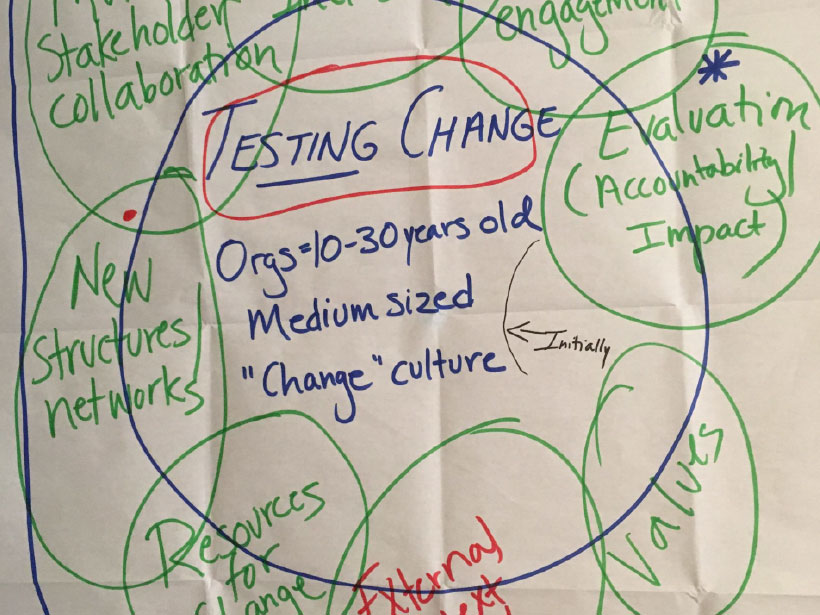The Testing Change project I founded and am managing had an in person gathering earlier this month. It was a great opportunity to really grapple with the concept of what we mean by ‘paradigm change’ and how we can help bring it about.
The disruption of the times we live in are calling for many organizations to think about doing things in very different ways and in some cases ‘going outside their lanes’. If your organization is navigating some significant change some of these ideas may be useful to you. Real paradigm change is hard as it calls into question all of our comfortable ways of operating – the ways we have been trained and what we may have been doing for years or even decades. But if we want to have significantly different results, we need to do things in significantly different ways. Some tips from the Testing Change gathering:
- Organize differently – Why stay within the guidelines of traditional committees, working groups or task forces? Can more flexible structures produce better results?
- Find and use peer support – Peer support is always helpful but for many busy senior level practitioners making the time to connect with peers can fall to a low priority level. But in times of significant change and disruption this peer support is no longer just a luxury. Having people in similar situations to ask for advice, bounce ideas off, help give your change directions validity, or even just be able to vent with (rather than having to remain positive in order to encourage your team), can be an invaluable resource.
- Reach out of your own networks – Even those of us who consider ourselves ‘good networkers’ still often operate within relatively small boundaries compared to all of the good ideas and program that exist or are being tried around the world. Spending a little more time consciously looking for information and contacts outside of your networks and usual sources of information can have huge benefits.
- Facilitation – Discussions you lead that call for paradigm change may call for a different kind of facilitation style. Paradigm change needs on-going practice to change our mind-sets and normal behavior patterns. This can call for strong and creative facilitation to encourage people to not fall into accustomed tracks but continually step off of them. We‘ve been somewhat surprised at how easily all of us (even those of us who consider ourselves ‘change agents’) fall into these patterns and how important it is to be intentional about changing some of the patterns we have become accustomed to.
- Conditions for change – We have some ‘traditional’ ways of navigating change but are they enough (or indeed well suited) for our current environment and the kind of paradigm change we need? What are some of the conditions needed?
- Advocates for multi-year efforts and commitments.
- Learning organizations – changing organizational cultures, not just going incrementally from ‘good’ to ‘great’ – that’s good but is it enough to be resilient through disruptive times?
- Pushback on ‘linear’ theories of change to more diverse pathways.
- Ways to balance what is urgent (disruptive of the way we have traditionally worked) with what is manageable. Despite our visions we all do have certain constraints.
- Moving away from internal siloing and also encouraging less siloing externally (among support organizations) to allow our organizations to be more holistic as we seek solutions to complex challenges.
- Shifting balance of power – different kinds of governance structures and relationship between board and staff. (Boards also having the same kind of shift of mindset needed to address and adapt to changing external conditions).
- Resources to support this kind of work.
You may not (and probably won’t) have all of these conditions for change all at once, but perhaps knowing that others are also walking this path with you will help it to become just a bit easier.
